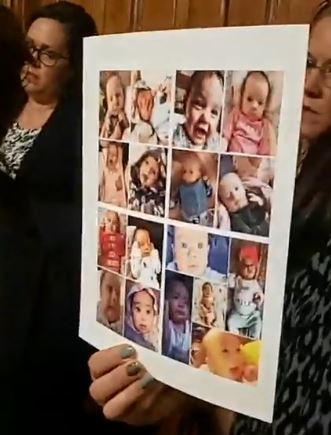***We are republishing our most popular stories from 2020. We hope you enjoy this look back! If you appreciate what The Iowa Standard does, please consider becoming a monthly supporter. Even just $5/month will help sustain us well beyond 2021! You can sign up here to be a supporter, or find us on PayPal at [email protected] or Venmo at Iowa-Standard-2018. You can also send a check:
PO Box 112
Sioux Center, IA 51250
We appreciate all who support us and thank you for an outstanding 2020!***
Senate File 2172 drew a crowd Monday for an Iowa Senate subcommittee. The bill, sponsored by Sen. Dennis Guth (R-Klemme) and co-sponsored by Senators Craig Johnson (R-Independence), Jim Carlin (R-Sioux City) and Jason Schultz (R-Schleswig), requires a certificate of death form for medical examiner cases for infants 0-3 years old shall include a request for information regarding the date and type of the decedent’s last immunization.
If the decedent received more than one immunization at the time of the last immunization, the information provided shall include all types of immunizations received.
It was met with opposition from public health officials and heavy support from a group of about a dozen concerned mothers.
Amy McCoy with the Iowa Department of Public Health said the organization is registered undecided on the bill. She said she wanted to learn more about the intent of the bill, which appears to be linking toddler and infant deaths with immunizations.
McCoy cited concerns over HIPAA laws in accessing the vaccination records and noted it would add time to an already time-strapped department.
However, deputy state medical examiner Dr. Jonathan Thompson, said it would add only an hour of extra work and there are about 40 deaths per year over the last five years involving children that young.
The Department of Public Health did note there is already a child death review team that investigates any death of someone under 18 that is not a natural death. This review includes past medical history and, Dr. Thompson said, sometimes includes immunization history.
Carlin, who chaired the subcommittee, asked for studies on the effects of multiple vaccines being given at once in the same day. The Department of Public Health said they could get him a study on that, but Courtney Collier, a concerned mother, said her Des Moines pediatrician has told her no such study exists.
Collier spoke in support of the bill, saying she represents families who have had toddlers die in Iowa.
“As an advocate for these families, I can tell you that the stories are always very similar,” she said.
She said one family had a daughter die 12 hours after her four-month vaccine.
“It’s always the same,” she said. “What’s interesting, in the investigative report for these deaths, it specifically asks or notes that the parents commented their child was recently vaccinated. Twelve hours or two days before, it’s already in the investigation report from the medical examiner’s team, so I don’t understand why it can’t just be transferred to the death certificate.”
Catie Clobes spoke in support of the bill. She spoke about the relationship between vaccines and Sudden Infant Death Syndrome (SIDS). She said the SIDS investigation form, which is mandatory and required by the CDC, asks if the infant was vaccinated or received any medication within the past 72 hours.
“It only makes sense that this information would be available on a state level as well,” she said. “And, I’d like to add that SIDS is not a disease, it is a syndrome. And vaccinations can induce a SIDS death and there is research to support this.”
She spoke about her daughter, who died 36 hours after her six-month vaccine last March. With “much evidence” to support vaccines being the culprit, there was no official code being the cause of death.
“A mother knows what happened to her child in the circumstances,” she said. “That no cause of death or the wrong cause of death is determined — adding vaccinations recently received as a contributing factor would put a grieving parent at ease because you acknowledge their beliefs. This would take about 30 seconds to do, not an hour.”
Julya spoke in support of the bill. She cited the death of Erica Sarver, a 3-year old in Iowa in 2008. Julya said when Sarver was 12 months old, she received the MMR vaccine and had seizures. It led to a disorder that affected her brain. During litigation, Sarver died.
“On her death certificate provided by the federal scientists that determine vaccination deaths, it was determined on her death certificate that it was from her MMR vaccination specifically,” Julya said. “And this was in Iowa. I don’t know if anyone here has ever heard of this case. It’s actually kind of sad that not many people know about it.”
Brei Johnson of Informed Choice Iowa said the group supports the legislation. She said children have more complex health conditions today than at any other time and the CDC has not thoroughly performed long-term safety studies of the current 69-dose schedule. Also, she noted $4.3 billion has been paid out by the vaccine injury compensation fund since 1986.
“Everybody should work really hard to unturn every stone to get those parents the answers that they deserve, whether it’s a police officer, whether it’s a medical professional, whoever,” she said. “We should be getting those parents the answers they deserve. To turn over every single rock, but not to leave this one turned over, I start asking a lot of questions why. Why wouldn’t we turn that rock over and give those parents that answer and be able to check that box without clear thought our without a doubt that no, your baby did not die from that vaccine? Or, maybe, start looking and creating statistics here in Iowa that might show it is.”
Lina Tucker Reinders of Iowa Public Health Association talked against the bill.
“Our children have a right to be healthy and we have the tools to prevent diseases,” she said. “We owe it to our children to maintain Iowa’s strong culture of vaccinations.”
Reinders said there is no concern or doubt that vaccinates are safe.
“We know that vaccines prevent deaths,” she said. “We are concerned that the package of vaccine-related bills that have been introduced this session will not together increase Iowa’s vaccination rates or serve to protect children from vaccine-preventable diseases, to the contrary. We’re concerned that they will introduce doubt to parents who have well-placed trust in their medical providers and the public health community.”
Reinders said nobody there was there to debate any individual case or the finding in an individual case.
“But, at the population level, we know that vaccines prevent diseases and we want to maintain Iowa’s strong culture of vaccination. Vaccine hesitancy is a threat to the health of Iowans, and the only thing that spreads faster than preventable diseases is misinformation.”
Sen. Guth discussed where the idea for the bill originated.
“It was brought to me by a medical examiner,” he said. “This medical examiner said on the death certificate for a 0-3-year-old child, there are eight questions about what is the last thing that child ate. There’s only one question about vaccinations and that is was the child current on all of their vaccinations at the time of death.
“He just said we need to know a little bit more about what was injected into the children. He just came and asked this and I thought this was a very reasonable idea. It’s something that is not pro-vaccination or anti-vaccination, it is only about understanding what’s going on. It’s only about facts.”
Deborah Thompson, a volunteer with the Iowa Public Health Association, said she also worked with the Department of Public Health for eight years.
“I think we can all agree, especially under the Golden Dome, that anybody who speaks with confidence can sell a point,” she said. “What we can’t lose sight of is what makes a person credible. I would be concerned with how the information is used because when I see the debate going back and forth, I see a lot of things that are twisted, misguided and used to degrade the credibility of our medical professionals.”
Thompson said there is no perfect solution.
“We will never get every single rock unturned for everything that causes a human being to pass away, so the idea that by putting this information on, which set of researchers picks it up and then what happens to it then,” she asked. “How is it used to wield in defense or for a particular set of arguments. When I think about Iowa’s immunization laws, I’m very proud of what we’ve been able to accomplish.”
However, she said, when she started at public health and was speaking on bills like this, there was only one advocate for that side.
“It has grown,” she said. “What you’re seeing is a slow degradation because you all are very, very effective. Your mothers, it’s hard to argue against you. You’re mothers who have lost, it’s hard to argue against you. I think that we have to do the best we can to make sure that we are in solidarity doing the right thing because there is science.
“My question back to you is if you have all of this information and it doesn’t come back the way you want it, are you willing to accept it or is there another scientific study that we have to look at and see? This is no longer a scientific debate. In many respects, it is now an emotional argument. A lot of the time those are hardly ever won. In the meantime, a lot of misinformation is going on like in subcommittees like these.”
Carlin asked what the downside is of looking at the 30-40 cases per year to supplement the research and give more context.
“It doesn’t seem like a big burden,” he said.
Sonya Swan said that Dr. Thompson admitted earlier sometimes there is vaccination information for dead kids and sometimes there is not.
“Again, this is a medication and all medications have some risks,” she said. “I think that it’s disingenuous of any Department of Public Health or medical professional, in general, to say that vaccines have zero risks and they’re always safe and they never cause a death.”
She said all the bill is asking for is for 40 hours to compile the data throughout the year.
“That all vaccines cause SIDS, certainly we can’t jump to that conclusion,” she said. “And certainly we can’t jump to the conclusion that it doesn’t ever affect any child period or contribute at all in any way — fever, anything — to any death. Even if it was just a small part. It doesn’t mean that nobody needs to vaccinate ever, it just means we need to know that for future safety studies and to make vaccines safer.”
Meg Oberreuter is a former nurse who has a son with Autism. He was diagnosed in 1983. She said her son was four or five per 10,000.
“Now it’s 1-in-36 or worse,” she said. “We are doing something to our kids. Fifty-four percent of our kids have an autoimmune, chronic condition. We cannot run a state this way.”
Oberreuter used to work in public health. She told a story about a neighbor who had a friend lose a child shortly after a vaccination. Oberreuter talked with the assistant director at the health department and was asked what she wanted him to do.
“They really just shut me down,” she said. “Then I was put on restrictions. If I said anything against the vaccine program I would be fired instantly, no questions asked.”
Johnson and Carlin signed the bill out of subcommittee while Sen. Amanda Ragan (D-Mason City) did not.












